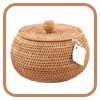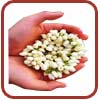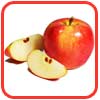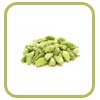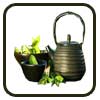 SPECIALTY OF KASHMIR APPLE
SPECIALTY OF KASHMIR APPLE
Kashmir proudly known as the paradise of earth is also home to temperate fruits like apple for which the state is very famous across the globe. The main factor which influences temperate fruit bearing trees is soil, climate and environment which are highly favorable and unparalleled in the province of Kashmir. Apple (Malus pumila) is commercially the most important temperate fruit and is fourth among the most widely produced fruits in the world after banana, orange and grape. Man has very little control over nature especially factors like the climatic conditions which influences the geographic distribution of various kinds and varieties of temperate fruits. Although apple can be grown in all temperate regions including both the northern and the southern hemisphere it is not possible in the tropical climate of South Asia.
 APPLE GROWN ONLY AT HIGHER ELEVATION
APPLE GROWN ONLY AT HIGHER ELEVATION
Hence apple is grown only at higher elevation where the temperature drops down to a very low level which is highly required for the growth of such fruit bearing trees. Thus in the Indian sub continent the Himalayan region especially the state of Kashmir which is noted for its monsoon is supposed to be the most favorable location for the growth of not only apples but also other temperate fruits. Kashmir has a distinct identity of having an unbroken historical record for its temperate weather conditions from early days to present period. It is believed that things which are difficult to be got even in heaven like lofty houses, saffron (crocus), grapes, icy water and the apples are easily available here. The freely available fruits of the state form an important part of the diet of the people.
 MENTIONS ABOUT THE KASHMIR APPLE
MENTIONS ABOUT THE KASHMIR APPLE
There are lot of mentions about the Kashmir apple in history where the famous Chinese pilgrim Huen Tsang who travelled to Kashmir has made a mention of various temperate fruits like Pears, Wild Plum, the Peach, the Apricot, Grape and the Apple. The breathtaking and the stunning beauty of the valley of Kashmir and its temperate fruits like apples has been complimented by people from different areas including writers and travelers belonging to different ages and nationalities. It was the Mughal emperor Jehangir who named Kashmir as the Paradise on Earth for the valley is featured with snow capped peaks and sparkling streams, high pastures carpeted with alpine flowers, fertile valley rich with fruits and grain and its lakes and springs. It has been considered from time immemorial that planting any fruit or nut tree as sacred here in Kashmir.
 IMPORTED MANY FRUIT GRAFTS FOR FURTHERANCE
IMPORTED MANY FRUIT GRAFTS FOR FURTHERANCE
Long before the Moguls (16th Century), the Shamir rulers had laid out gardens and orchards in the valley. Sultan Zain-ul-Abidin "Budshah" (1420- 1470AD) imported many fruit grafts for furtherance during his reign along with the art of grafting from Central Asia. There are lot of historical evidences that state that the valley of Kashmir in Himalayas is rich in apple, pome, nut fruits and grapes. Modern cultivator of fruit trees consider that apples have an origin starting from the temperate zone of Britain in the northwest to Himalayas in the Southeast which accounts for a very vast area.
Bears Crab Apple considered to be Bear food, have been widely used as apple root stock in Kashmir. Kashmir has been a source for a long time of propagating material of temperate fruits and nuts for other temperate areas of the Indian subcontinent.
 PEOPLE OF KASHMIR MOSTLY IDENTIFY ANY OF THEIR NATIVE FRUIT
PEOPLE OF KASHMIR MOSTLY IDENTIFY ANY OF THEIR NATIVE FRUIT
The people of Kashmir mostly identify any of their native fruit or plant or tree or flower only by their local nomenclature. Apple in their local nomenclature is referred as Chunt, Pear by tang, Apricot by Chaer, Walnut by Duon, Poplar by Fresst, Willow by Weer, Wild cherry by Alich, Plum by Aer, and Grape by dache and so on. But however now there are a lot of improved varieties available in the market which is mainly at the cost of wild aboriginal. But even if nature favors, man is getting very ruthless with it for most of the broad leaf species of native fruits are cut for fuel and commerce over time thus minimizing their existence. Till 1945 there was no clear identification of scientific nomenclature and detailed report of fruit tree-varieties of various kinds that are grown in Kashmir.
 AVAILABILITY OF 113 VARIETIES OF APPLES
AVAILABILITY OF 113 VARIETIES OF APPLES 
It was only after various surveys it was identified the availability of 113 varieties of Apples, 62 varieties of Pears, 31 of Plum, and 14 of Cherry in early, medium, and late groups, besides scores of wild crabs/Pip etc.But still there are various ancient records which state that the cultivation of the temperate fruits like apple is nearly 3000 years old. Kalhana in Rajtarangni makes mention of it in the reign of King Nara (1000 BC). One of the most famous places in the valley of Kashmir noted for its apple cultivation is Chunt Var for it has lot of apple yards.The fruit trees then were grown also on the path edges and sporadically in the agricultural fields and slopes to provide shade and food. Native origination of various kinds and types are responsible for the regeneration of the temperate fruits. It happens that when seeds are thrown on the ground after birds and animals eating the pulp of the fruit and threw it then stratification happens by forest litter and snow cover which results in regeneration under natural conditions.Palweth - Ambri apple of Kashmir and several others are instances existing.
 GROWING OF KASHMIR APPLE
GROWING OF KASHMIR APPLE
The total annual rainfall required for the growth and the fruiting of an apple tree is about 100-125 cm and can be grown only at an altitude of about 1,500-2,700 m. above sea level. However when there is an excessive rainfall during the ripening stage of the fruit then it results in poor quality of the fruit with improper color and fungal spots on its surface. The ideal soil required for the cultivation is loamy which is mostly organic having a PH of about 5.5 to 6.5, well aerated and proper drainage. Usually the fruit produced in dry temperate areas are said to be in good quality with high sugar content and indeed a long shelf life. The most common areas in Kashmir which is known for its apple cultivation are Srinagar, Budgam, Pulwama, Anatnag, Baramullah and Kupwara. A proper layout is required for the apple orchard. The planting is done in the month of January and February and the planting material is usually got from the nurseries which are registered with the government.
 PROPAGATION OF APPLE IS MAINLY DONE BY BUDDING
PROPAGATION OF APPLE IS MAINLY DONE BY BUDDING
Propagation of apple is mainly done by budding and tongue grafting methods. Based on the different types of planting density average number of plants are planted where an area of one hectare can have a range 200 to 1250 trees. On the valleys usually the hexagonal or the square system of planting is carried out whereas in the slopes a contour method is followed. Proper fruit setting can be best achieved by plantation of pollinator species like red delicious and golden delicious in between the main species. In the month of October-November, pits of size 1x1x1 m. are prepared for planting. In each pit, 30-40 kg. of FYM, 500 g. of single super phosphate and 50 g. of Malathion dust are added after mixing properly. Nearly after a month, planting is done followed by irrigation. Appropriate manures are given by the foliar spray. The water requirement of apple is 114 cm.
 DURING SUMMER THE PLANTS ARE IRRIGATED
DURING SUMMER THE PLANTS ARE IRRIGATED
Per annum there would be about 15-20 irrigations. During summer the plants are irrigated at an interval of 7-10 days and in winter the duration is quite long where irrigation is done at interval of about 3-4 weeks. The main irrigation is during the period of April to August which is main time after fruit set in. Proper growth and productivity with spur development is assured by timely pruning and training operations. Spindle bush system is suitable for high density planting under mid hill conditions. The weeds are controlled by mulching with hay or black alkathene. The soil moisture is conserved by dry grass or oak leaves. The texture and the nutrient of the soil are improved by intercropping with green manuring crops mostly sunflower and bean. Use of growth hormones is essential for good flowering and proper coloration in fruits. Heavy bearing in apple usually results in small-sized, poor quality fruits and sets in alternate bearing cycle.
-Fruit thinning is essential in pollinizing varieties for regulating adequate cross-pollination. Some of the most common diseases are collar rot (Phytophthora cactorum), apple scab (Venturia inaequalis), sclerotius blight (Sclerotium rolfsii), crown gall (Agrobacterium tumefaciens), cankers, die-back diseases, etc., which is usually managed by application of copper oxychloride, carbendazim, mancozeb and other fungicides. Yielding starts from the eighth year and goes up to 30 years and sometimes even to 40 years depending upon the agro-climatic condition. Usually the yielding gives a scale of an upper graph from the eighth to the seventeenth year and remains constant after that till 30 to 40 years. Harvesting is done before the fruit is fully ripe. The average yield of the Kashmir apple is about 11-13 tones/ha. Once the apples are harvested they are placed in a cool and ventilated place so that it becomes free of moisture. Then the apples are graded according to the size, quality and the appearance of the fruit.
- Apples can be stored for about 4-8 months after harvesting thus having a long shelf life than any other fruit. Packing of the apples is usually done with corrugated fiber board cartons or wooden boxes. Then from the orchards the apples are transported to the market. Marketing of the produce is mainly controlled by intermediaries like wholesalers and commission agents.Apple cultivation contributes to about 55% of the horticulture area of the state of Kashmir which includes 1, 50,000 hectares. The rate of the Kashmiri apple varies in each state varies- costs about Rs 105/kg in Delhi, Rs110/kg in Mumbai and Rs 120/kg in Bangalore even though its production cost is just about Rs 35 - 40 /kg. The reason are the agents who on the one hand rob the orchard owners of their earnings and fleece the customers on the other. Kashmir is the leading producer of apple in India known as the apple basket being one of the major economy of Kashmir with a turnover of about Rs 2500 crores plus. But still marketing is very hectic, expensive and laborious exercise but this has changed after certain taxes were waved off and local mandis were established.
-Though the systems and the processes have changed the market remains the same. The local investors have come up with a lot of storage units which has helped to regulate dispatches. The creation of a chain of mandis has reduced the efforts of the farmer where the buyers make direct entry into the market for direct purchase and there is no toll tax. The interventions at the banking level created a situation in which the credit is a no- frills access and the farmer is least dependent on the middle man who was an exploitative moneylender. But still there are grey areas where apples in Kashmir are being sold at a very cheap price for cheaper apples are imported from Iran and Afghanistan through the cross Loc route which is posing a serious threat to the apple growers.
-The Jammu and Kashmir bank owned by the state government has come up with lot of financial aid for the apple growers of Kashmir. The financial support is given at various levels like in the pre-harvest stage for production cost, harvesting stage for picking/packing/ grading, post-harvest stage for marketing or for the entire production and marketing cycle.Some of the bank financed units in Kashmir like the Fruit Master Agro Private Limited, Golden Apple, Harshana Naturals and Kachroo Integrated Cold Chain gets exemption from the excise duty and income tax benefits from the government. Some of the main local market in India for the Kashmiri apples is Delhi, Bangalore, Mumbai, Ahmadabad and other major cities.
 SPECIALTY OF KASHMIR APPLE
SPECIALTY OF KASHMIR APPLE APPLE GROWN ONLY AT HIGHER ELEVATION
APPLE GROWN ONLY AT HIGHER ELEVATION MENTIONS ABOUT THE KASHMIR APPLE
MENTIONS ABOUT THE KASHMIR APPLE IMPORTED MANY FRUIT GRAFTS FOR FURTHERANCE
IMPORTED MANY FRUIT GRAFTS FOR FURTHERANCE
 PEOPLE OF KASHMIR MOSTLY IDENTIFY ANY OF THEIR NATIVE FRUIT
PEOPLE OF KASHMIR MOSTLY IDENTIFY ANY OF THEIR NATIVE FRUIT AVAILABILITY OF 113 VARIETIES OF APPLES
AVAILABILITY OF 113 VARIETIES OF APPLES 
 GROWING OF KASHMIR APPLE
GROWING OF KASHMIR APPLE PROPAGATION OF APPLE IS MAINLY DONE BY BUDDING
PROPAGATION OF APPLE IS MAINLY DONE BY BUDDING DURING SUMMER THE PLANTS ARE IRRIGATED
DURING SUMMER THE PLANTS ARE IRRIGATED



